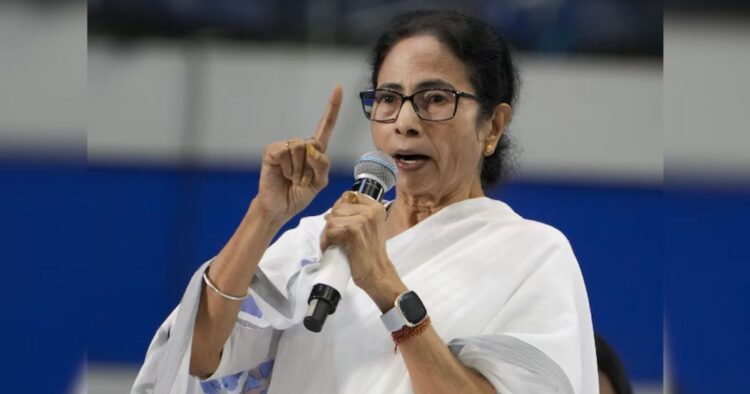KEY POINTS
- Mamata Banerjee opposed the implementation of the Waqf Amendment Act in West Bengal
- Mamata rejected the proposal, claiming it could lead to a presidential form of government
- She opposed the National Education Policy (NEP) and called for more attention to state governments' needs
West Bengal Chief Minister Mamata Banerjee said that the Waqf (Amendment) Act will not be applied in the state. She said she will continue to support minority communities. Speaking at a program held by the Jain community in Kolkata, she said, “I know many of you are upset about the “Waqf Act”. Don’t worry, in Bengal we won’t allow anything that divides people.”
Chief Minister said, “In border areas, we need to be careful. Making decisions too quickly can cause problems. Around 33% of Bengal’s people belong to minority communities—should we throw them out?”
This shows that West Bengal government misguide the public and influence in a negative way by spreading the lies about the Waqf Amendment Bill. There has been a lot of confusion and uncertainty about the Waqf Bill. Many people, especially in the Muslim community, are not fully aware of what the law is about, and there is a lot of misinformation going around.
There have been several incidences of violence following the passing of Waqf Amendment Bill. Violence broke out in Murshidabad district, West Bengal, during a protest against the Waqf Act. The violence happened after a rumour spread that a protester had been injured or died during clashes with the police. Because of this, the authorities have imposed restrictions in the affected areas.
There was a big uproar in the Jammu and Kashmir Assembly regarding the Waqf (Amendment) Bill that was recently passed in Parliament. The ruling National Conference (NC) wanted to discuss the new law, which was approved after President Droupadi Murmu signed it. The NC submitted a notice asking for a special discussion on the law, but the Speaker of the Assembly refused. This led to a lot of noise and chaos in the House.
West Bengal Chief Minister Mamata Banerjee has expressed opposition to several central government policies over the years.
Opposition to ‘One Nation, One Election’
Mamata Banerjee opposed the BJP-led Centre’s proposal for “one nation, one election.” She said it was a plan to change the country’s constitution and secretly introduce a presidential form of government.
Mamata has spoken against the idea of holding elections at the same time in the past as well. She has given false claims that the BJP wants to use this plan to destroy India’s federal system and bring in a system where the president has more power, like in some other countries.
Rejection of the National Education Policy (NEP)
West Bengal Chief Minister Mamata Banerjee said that the Centre should pay more attention to the needs of state governments and not force policies on them. She also mentioned that state governments should not be pressured to follow the National Education Policy (NEP).
Opposition to the “National Eligibility cum Entrance Test” (NEET)
West Bengal Chief Minister Mamata Banerjee wrote a letter to Prime Minister Narendra Modi, demanding the abolition of the National Eligibility-cum-Entrance Test (NEET). She urged PM Modi to “take immediate and decisive steps” to revert to the previous system, wherein state governments conducted their medical entrance exams.
Criticism of NITI Aayog
West Bengal Chief Minister Mamata Banerjee stated that the Modi government’s NITI Aayog should be scrapped and the old Planning Commission should be brought back. Although most chief ministers of the INDIA alliance decided to skip the meeting, Mamata said she wanted to attend because she felt their voices should be heard together on a common platform.
Disagreement with Central Directives on Independence Day Celebrations
West Bengal Chief Minister Mamata Banerjee stated that schools in the state celebrated Independence Day in their own way, according to their choice. The state government had told schools not to follow the Centre’s instructions for celebrating Independence Day. The Centre had asked schools to create a lot of excitement about Prime Minister Modi’s New India Mission and to take a “Sankalp se Siddhi” pledge, but the state decided not to follow that. The School Education Department of West Bengal announced that Independence Day in 2017 would not be celebrated the way the Centre suggested.

















Comments